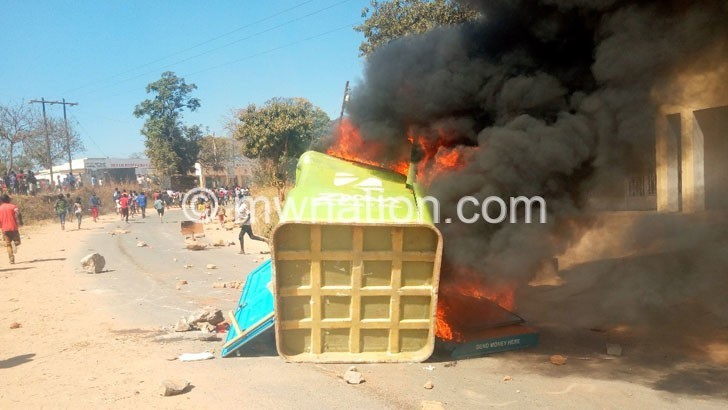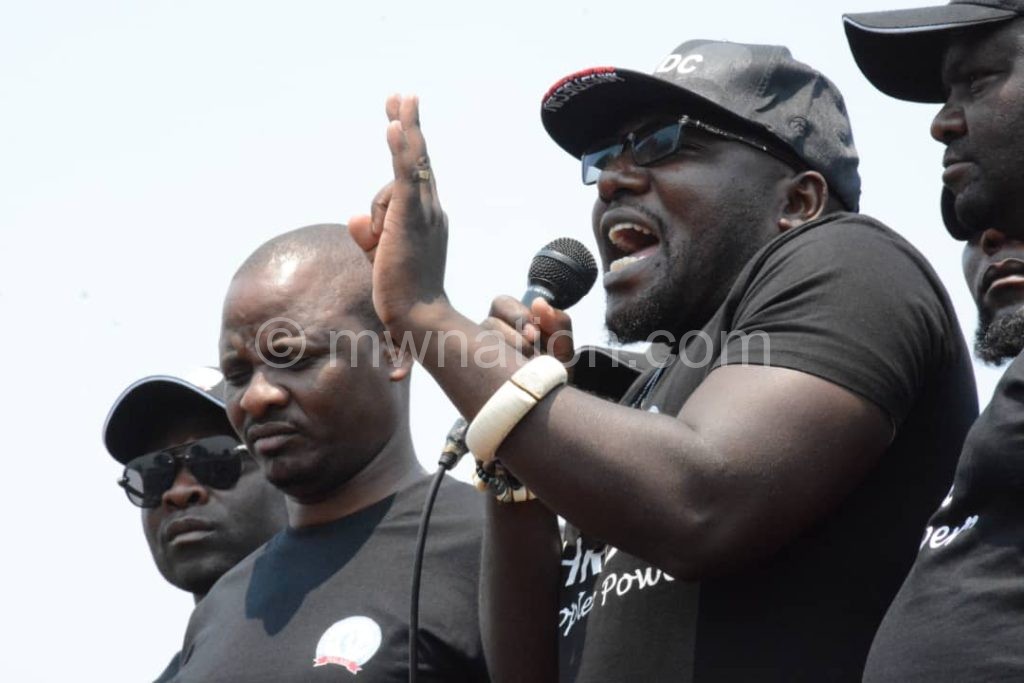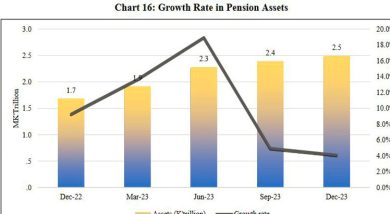How long will demos persist?
Rodrick Mphatika is praying for a quick end to serial protests convened by the Human Rights Defenders Coalition (HRDC) to bring down Malawi Electoral Commission chairperson Jane Ansah.
The marches catalysed by the May 21 elections have been marred by violence, looting and burning.

The businessperson based in Salima accuses the protesters of not living up to the promise to march peacefully.
“It is everyone’s constitutional right to demonstrate, but these demonstrations need to end. Businesses have gone down because we are not free to trade without fear. People with money cannot start businesses because they are afraid. Many shops continue to be looted during these demonstrations and the economy is going down,” he says.
The anti-Ansah protests often bring business to a halt. When demonstrators go marching, many shops in Lilongwe, which have been draped in burglar’s bars, close down. In this way, the businesspersons forfeit their daily income to protect their property.
They feel the post-election protests have gone on for too long, with the desired result nowhere in sight.
Five months after the controversial elections, Ansah has refused to give in to “mob justice”, saying the matter is court.
Presently, the Constitutional Court is hearing the case in which Malawi Congress Party (MCP) president Lazarus Chakwera and UTM Party’s Saulos Chilima want judges to nullify President Peter Mutharika’s re-election and order a re-run. Even Mutharika has refused to sack Ansah, discrediting the protests as a political tactic to usurp power from a legitimately elected president.

He has ordered both the police and soldiers to use force to stop the marches, but the demonstrators appear undeterred—with the Malawi Supreme Court of Appeal upholding their right to demonstrate peacefully and unarmed.
Last month, Justice LovemoreChikopa quashed Attorney General KalekeniKaphale’s petition to stop HRDC demonstrations on the basis that the police do not have the capacity to enforce law and order during the recurrent mass protests. He also dismissed the State’s request for the human rights defenders to pay for damages caused during their marches.
The rejected path was more pronounced in Blantyre where the city council vowed not to permit demonstrations unless HRDC pays for goods destroyed in past marches.

Chikopa ruled that the protesters need not get permission from councils, but just notify them at least 48 hours prior to the march. He refused to grant unlawful restrictions on demonstrations regardless of the occurrence and possibility of the criminality.
He told the police there are better ways of dealing with the violence and criminality, saying the Inspector General should have shown how lack of resources was through no fault of the police service and that they have done all they could to no avail.
The verdict reads: “For instance and about the police alleged lack of resources, the situation is not to stop demonstrations. It is to resource the police adequately. Otherwise, we will be allowing them to benefit from their own inefficiencies. But more than that, we think the Inspector General could have done more to prove a lack of resources. It is not enough in our view to just stand up and claim a lack of resources. We think anyone can do that.”
This shatters claims of police shortfalls spanning from the July 20 2011 protests in which they killed 20 people. Three months ago, newly retired police chief Rodney Jose claimed that the police could no longer cope with violent elements whom he accused of attacking them in their line of duty.
However, Chikopa’s ruling vindicates HRDC stance that violence is thriving on lax policing, with soldiers jumping to the front to protect civilians and property during protest marches.
Recently, the police looked away as governing Democratic Progressive Party (DPP) youth cadets attacked human rights defender Billy Mayaya in Blantyre.
Despite the reign of terror, HRDC is petitioning hard to force Ansah to resign for presiding over what they consider flawed elections.
Its chairperson, Timothy Mtambo, states: “As HRDC, we continue to look at different ways to sharpen our strategy. Each demonstration is giving us new insights. However, the strategy should not be judged by simply looking at how long Ansah stays in office. We need to look at the bigger picture.
“The choice is hers to make; whether to stay on and continue seeing these protests or resign honourably. For sure, no Malawian will allow her and MEC to get closer to our elections again. That I can assure her.”
But after the slew of violent protests, some Malawians are already asking: How long will the post-election demonstration run?
Political scientist Ernest Thindwa says “only if HRDC and Ansah find a common ground”. He reckons that activists will most likely continue holding demonstrations because “they are ticking their boxes” as voices of the voiceless.
“Each time they hold the demonstrations, they are scoring a point both locally and internationally. So, they have an incentive to continue organising people to demonstrate because that is one of their key result areas. I can sense that as long as Jane Ansah is still MEC chairperson, they will continue to demonstrate,” he explains.
Thindwa, from the University of Malawi’s Chancellor College in Zomba, reckons that government has more to lose “because the economy is taking a knock”.
“This knock will have a multiplier effect as most people will be affected. When that happens, their perception of government will not be positive, which is a cost to those in power,” he says.
To Joseph Chunga, another political scientist, no-one can put a deadline to human rights, including the right to demonstrations.
“When people want to demonstrate for or against something, it is within their right to define the cause. So, whether some people are happy or not happy, as long as the protesters are doing it within the provisions of the Constitution, they can do it for as long as they want,” he explains.
Chunga alludes to the ongoing Hong Kong protests against China’s proposed extradition law, saying demonstrations can be sustained for weeks or months when the protesters’ demands are not met.
He questions the impact of alternative ways to settle the dispute: “We have been talking about dialogue for months, but is there any serious dialogue that happened for us to say that instead of demonstrations, there is Option B to resolve the issues of concern the demonstrators are presenting?
“If there were such avenues and they are being ignored deliberately by the demonstrators, then one would be asking: what is their motive?”





